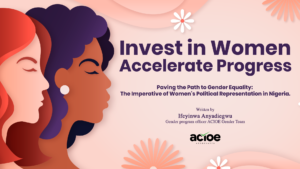Paving the Path to Gender Equality: The Imperative of Women’s Political Representation in Nigeria
 In Nigerian demographics, women and girls constitute a formidable force, comprising over 49% of the total population of over 200 million, as reported by the World Bank. Women remain significantly underrepresented in the political sphere. This stark disparity between their demographic strength and their presence in government underscores a crucial challenge for Nigerian society.
In Nigerian demographics, women and girls constitute a formidable force, comprising over 49% of the total population of over 200 million, as reported by the World Bank. Women remain significantly underrepresented in the political sphere. This stark disparity between their demographic strength and their presence in government underscores a crucial challenge for Nigerian society.
A profound gender imbalance casts a long shadow over Nigeria’s National Assembly. Since the return of the Democracy in 1999, the number of women holding seats has consistently fallen far short of parity. In the first year, only 15(3.2%) women out of 469 secured positions, starkly contrasting the overwhelming majority held by men. While a glimmer of progress emerged in 2003, with 24 (5.1%) women, and in 2007, only 34(7.2%) women represented the population, this improvement proved fleeting. From 2011 to 2019, the number of women in the National Assembly remained disappointingly low, averaging around 31, representing a mere 6.6% of the total seats. This representation culminated in the dismayingly low number of 19 (4.05) women elected to the National Assembly in 2023, as the Nigeria Bureau of Statistics (NBS) reported. This persistent disparity transcends a mere numerical imbalance; it is a potent symbol of a systemic issue deeply entrenched within Nigerian society, demanding urgent attention and decisive action to ensure equitable representation for all.
In distinct contrast to recent strides made by other African nations, such as Sierra Leone’s groundbreaking passage of the Gender Equality and Women Empowerment Act (GEWA), mandating a minimum allocation of 30% of parliamentary seats to women, Nigeria lags in institutionalizing such progressive measures. This legislative landmark in Sierra Leone serves as a beacon of hope, heralding a new era of inclusivity and empowerment for women in governance.
Yet, Nigeria’s reluctance to embrace similar reforms stems not from a lack of capable and qualified female leaders but from deeply ingrained societal biases and misconceptions. Women navigating Nigeria’s political landscape are more likely to face heightened scrutiny and skepticism, with their competence and suitability for leadership roles unjustly called into question.
This year’s International Women’s Day (IWD), themed “Invest in Women, Accelerate Progress“, highlights the importance of empowering women and girls in different sectors, which holds an immense transformative power. By doing so, we can bridge the persistent gender gap across all industries in Nigeria, including the political landscape, paving the way for a more equitable and flourishing society for all.
ACIOE Associates, through its commitment to gender equality in Nigeria and Africa, partnered with others to develop the Women’s Economic Empowerment (WEE) Policy in 2023. ACIOE Associates strives to be a leader in expanding women’s political voice and economic power through this and other initiatives. ACIOE advocates for a transformative policy document mandating equitable representation for women within Nigeria’s National Assembly, Ministries, and the private sector.
Our commitment to Nigerian women transcends mere rhetoric; it is a solemn pledge to stand in solidarity, to amplify their voices, and to champion their rights. Together, let us forge a future where women occupy positions of influence and leadership commensurate with their invaluable contributions to our society. let us reaffirm our collective resolve to dismantle barriers, challenge norms, and usher in a new era of inclusivity and empowerment for all.

